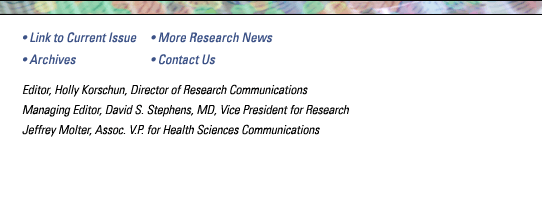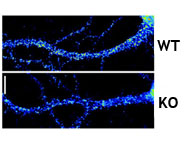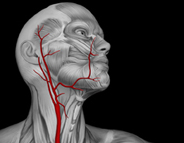 |
 |
|||||||
| April 25, 2011 | Research Extras Emory's Healthcare Innovation Program provides information, resources, and community connections to support innovation in health services research. Key topics available on a new website include quality, cost and access to health services. The program is guided by leaders from Emory, Georgia Tech, and the ACTSI, and is directed by Fred Sanfilippo, MD, PhD. iResearchGeorgia is a searchable database of biomedical expertise at Georgia's public and private research universities. The initiative was developed by the Georgia Research Alliance in partnership with the University of Georgia, the Governor's Commission for a New Georgia, and the Georgia Department of Economic Development. Attend the Future Makers lecture Tuesday, April 26 at 5:00 p.m. with William Stead, MD, associate vice chancellor for health affairs and chief information architect at Vanderbilt University.
|
|||||||
|
Mark Rigby, MD, PhD |
||||||||
| |
||||||||
Sound Science: When T-Cells Run Amok in Diabetes |
||||||||
| New Clue Found for Fragile X – Epilepsy Link A protein that regulates electrical signals in the brain may explain why so many people with fragile X syndrome also develop epilepsy. Fragile X syndrome is the most common inherited form of intellectual disability. Scientists believe knowing its effects on other brain proteins could help them develop effective treatments. Read more. . . |
||||||||
| Antidepressant Use Is Connected to Thicker Arteries People who take antidepressants could develop thicker carotid arteries and have a greater risk of heart disease and stroke. Depression is already known to raise heart disease risk, but a study of adult twins found a separate risk with antidepressant use. Antidepressants have a known clinical benefit, though, and researchers say no one should stop taking them based on this study alone. More research is needed to sort out the reasons for the discovery. Read more. . . |
||||||||
| Pediatric Nanomedicine Center Links Children's, Georgia Tech, Emory Physicians and engineers in a new pediatric nanomedicine center will develop targeted, molecular-sized nanoparticles to diagnose and treat pediatric heart disease and thrombosis, infectious diseases, cancer, and cystic fibrosis. They also hope to use nanomedicine to treat and eventually cure sickle cell disease, first in a mouse model, then in human patients. Read more. . . |
||||||||
|
Contagious yawning
|
||||||||
| Chimpanzees' Contagious Yawning Shows Empathy With Peers Contagious yawning is not just a marker of sleepiness or boredom. For chimpanzees, it may actually be a sign of a social connection between individuals. Scientists at Yerkes Primate Center found that chimpanzees yawn more after watching familiar animals yawn than when watching strangers. This may help with understanding empathy in both chimpanzees and humans, as well as how social biases strengthen or weaken empathy. Read more. . . |
||||||||
 |
 |
|||||||




